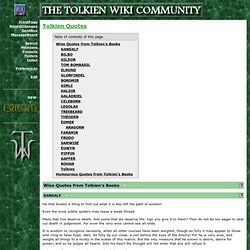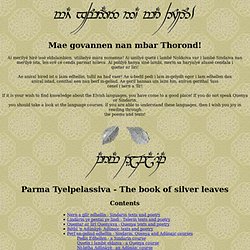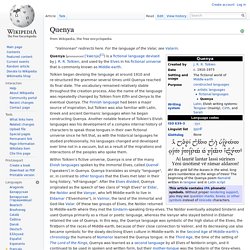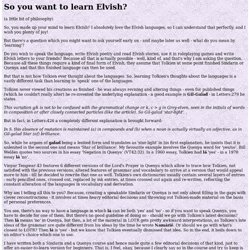

Yassë lertal parë i lambë eldaiva. Tengwar Tutor. TolkienWiki: TolkienQuotes. He that breaks a thing to find out what it is has left the path of wisdom.

Even the most subtle spiders may leave a weak thread. Many that live deserve death. And some that die deserve life. Can you give it to them? Then do not be too eager to deal out death in judgement. It is wisdom to recognize necessity, when all other courses have been weighed, though as folly it may appear to those who cling to false hope. Only a small part is played in great deeds by any hero. A treacherous weapon is ever a danger to the hand. It is wisdom to recognize necessity, when all other courses have been weighed, though as folly it may appear to those who cling to false hope. To crooked eyes truth may wear a wry face. Often does hatred hurt itself! The burned hand teaches best. A traitor may betray himself and do good that he does not intend.
Sindarin - the Noble Tongue. Write Your Name in Elvish in Ten Minutes. Write Your Name in Elvish in Ten Minutes You want to write your name in Elvish, but every place you go seems to make it harder than it ought to be.

Elvish writing looks beautiful and mysterious, but does it really have to be impossible to understand? Why doesn't somebody just spell out the alphabet so you can simply substitute the letters and get straight to the result? That's exactly what I've done here. Learn to write your name in Elvish in ten minutes. Here's the alphabet. That's it. Generally the vowels go above the consonants, but sometimes, in the case of Y and silent E, they go below. The straight line underneath is just one way to make one character do the work of two. The line above a consonant means that a nasal N or M precedes the consonant in question.
Here's one last example with two different letter combinations. I am often asked how to handle double vowel situations. Parma Tyelpelassiva. Ai merilyë hirë issë eldalambion, utúlielyë mára nomenna!

Ai umilyë quetë i lambë Noldoiva var i lambë Sindaiva nan merilyë ista, len orë cé cenda parmat nóleva. Ai polilyë hanya sinë lambi, merin sa haryalyë alassë cendala i quetar ar líri! Ae aníral hired ist o laim edhellin, tullil na had vaer! Ae ú-bedil pedi i lam in-gelydh egor i lam edhellen dan aníral istad, cenithal aen nan berf in-geliad. Ae geril hannas uin laim hin, aníron gerithal 'lass cenel i nern a 'lîr! If it is your wish to find knowledge about the Elvish languages, you have come to a good place!
Contents Nern a glîr edhellin - Sindarin texts and poetry I vrennil vain ben-dihenad a translation of 'La Belle Dame sans Merci' by John Keats. Thia sui balan enni... Thinnant Ithil another poem by Sappho.Calligraphy by Evenstar on Ambar-Eldaron I nennin a slightly depressing poem by myself. Aduial a haiku-like poem by myself. Cuil nîn prestannen a lovesong by myself. Man râd bedithon aen? Cenna nin tan ve Vala... Quenya. "Valinorean" redirects here.

For the language of the Valar, see Valarin. Tolkien began devising the language at around 1910 and re-structured the grammar several times until Quenya reached its final state. The vocabulary remained relatively stable throughout the creation process. Also the name of the language was repeatedly changed by Tolkien from Elfin and Qenya to the eventual Quenya. The Finnish language had been a major source of inspiration, but Tolkien was also familiar with Latin, Greek and ancient Germanic languages when he began constructing Quenya. The language featured prominently in Tolkien's The Lord of the Rings trilogy, as well as in his posthumously published history of Middle-earth The Silmarillion.
External history[edit] J. The ingredients in Quenya are various, but worked out into a self-consistent character not precisely like any language that I know. Development[edit] In his lifetime, J. Learn Elvish. (a little bit of philosophy) So, you made up your mind to learn Elvish?

I absolutely love the Elvish languages, so I can understand that perfectly, and I wish you plenty of joy! But there's a question which you might want to ask yourself early on - and maybe later as well - what do you mean by 'learning'? Do you wish to speak the language, write Elvish poetry and read Elvish stories, use it in roleplaying games and write Elvish letters to your friends? Because all that is actually possible - well, kind of, and that's why I am asking the question. But that is not how Tolkien ever thought about the languages.
Tolkien never viewed his creations as finished - he was always revising and altering things - even for published things (which he couldn't really alter) he re-invented the underlying explanation - a good example is Gil-Galad - in Letters:279 he states But in fact, in Letters:426 a completely different explanation is brought forward: Lord of the Rings Wiki.